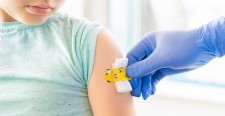MMR (Measles Mumps Rubella) vaccine
The MMR vaccine protects children against measles, mumps, and rubella. These are dangerous, even deadly diseases.
What is measles?
Measles is a severe and highly contagious respiratory infection. It is not “an ordinary infection that all children should have.” It starts with fever, severe cough and red eyes, then a red rash appears. In severe cases, it may affect the brain. Sometimes measles is called “red measles” (or rubeola). It should not be confused with “German measles,” which is another name for rubella.
Before the vaccine was approved in 1963, almost everyone got measles by the age of 18. In Canada, there were about 300,000 cases of measles every year. After the vaccine, that number fell to less than 20 cases a year. In recent years, there have been a few hundred cases after travelers brought the virus back to Canada where it spread locally
What is mumps?
Mumps is a contagious infection caused by a virus. It causes painful swelling of the salivary glands in the neck. In severe cases, it can affect the brain. Mumps is most common in children, although sometimes adults get it too. In older boys and adults, it may cause sterility.
What is rubella?
Rubella – sometimes called “German measles” – is also caused by a virus and is different from measles. Rubella is generally a mild disease in children, with fever and a mild rash. In pregnant women, rubella is serious because it can harm an unborn child.
How can I protect my child from measles, mumps and rubella?
Vaccination can protect your child.
In Canada, children get two doses of the MMR vaccine:
- The first shot is given at 12 to 15 months of age.
- The second shot is given at 18 months OR between ages 4 to 6 years (before your child starts school).
It is safe to give the second MMR shot as soon as one month after the first MMR shot, if needed.
In many provinces, the chickenpox vaccine is combined with the MMR vaccine (the combination vaccine is called MMRV).
If your child is between 6 and 12 months old and you live or are travelling to an area that has a known measles outbreak, talk to your child’s doctor about getting an early dose of the MMR vaccine. Keep in mind that your baby will still need to get their regular MMR shot when they are 12 months old.
Older children and adults born before 1970 and who have not been vaccinated or have not had these infections should also be vaccinated.
How safe is the MMR vaccine?
- This vaccine is very safe and effective.
- There may be some redness, swelling, or pain at the place where the needle went into the arm or leg. Your doctor can tell you how to control the pain.
- Between 6 to 23 days after the vaccine, some people will have a mild fever and sometimes a mild rash lasting 1-3 days. Occasionally adolescents and adults have joint pain (usually in the knees and fingers).
- Fever is more common with MMRV vaccine than with MMR. MMRV vaccine may also cause a few chickenpox-like lesions around the place where the needle went in.
Who should not get MMR vaccine?
- Because it is a live (weakened) virus vaccine, it cannot be given to pregnant women or to people who have weakened immune systems.
- Anyone who has a serious allergic reaction to a previous dose of the vaccine (swelling of the face or lips, difficulty breathing or a drop in blood pressure) should not get it again unless seen by a specialist and vaccinated in a special clinic that can control severe reactions.
Reviewed by the following CPS committees
- Infectious Diseases and Immunization Committee
Last updated: May 2021

